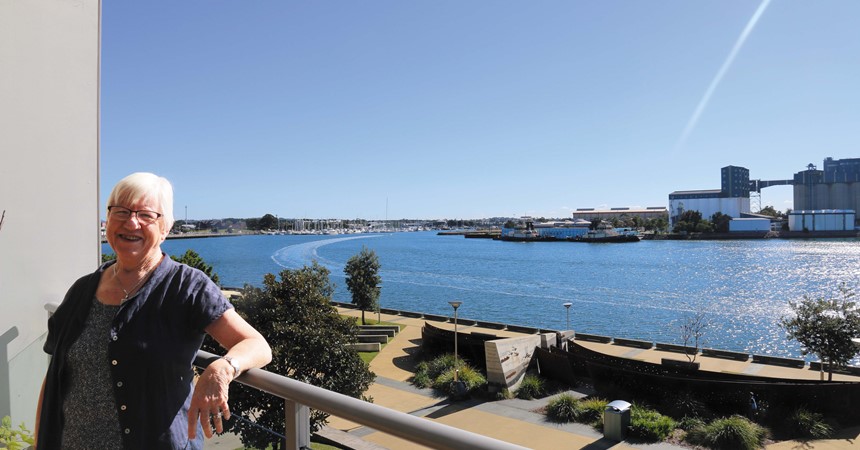Recently Margaret completed her memoir, Tree Change: Koalas in the kitchen – Butterflies in the bush; the story of her Sydney legal career, marriage, life changing move to two farms then finally an apartment close to the beaches of Newcastle with a magnificent view. Margaret admits, “We are so lucky. It would have been impossible to adjust to leaving the farm without having something like this to replace it.” After views of bush, greenery and valleys, watching the harbour each day is a bonus for Margaret.
Throughout her life, Margaret would “write down things when I thought of them − and when I put them all together, I had eight boxes of stuff!” That is how Tree Change was created, “I’ve written it over 26 years, just little bits and pieces and I’ve grabbed those bits and pieces and put them together when I had the time.” There is no chronology to Margaret’s memoir, but each of the chapters captures something of her experience; marrying Gregan, life in the city and the massive gamble of moving to the country and raising their family on a farm.
Margaret and Gregan discovered Dungog by accident. “We had to do a property settlement” within the family. They began by visiting this property for the children to see their cousins. “As we drove in I could see this little town − isn’t it beautiful?” At the time they were solicitors living highly stressful lives in Sydney. Margaret’s dad and grandfather were lawyers; she followed in their footsteps.
But living that anxious life wasn’t for Margaret and she realised, “What sort of a life is this, what sort of a life is it for our kids?” When an offer came for Gregan to work in a legal practice at Dungog, they accepted. Imagine the difficulty they had adjusting to country life! The children had to alter their lives too, “They didn’t really miss out on much, but they had to do the hard yards as well.” So began the family’s quest to own and run a farm in the area.
In contrasting city and country, Margaret says, “We had everything in the city, we were making big money, but to me that wasn’t something that made me happy. If you lived in a terrace house like we did, you didn’t have a garden, we had all these animals living in the back yard.” Always an animal enthusiast, Margaret says it’s something that was instilled in her from an early age. Possibly that is where her need for open spaces and being surrounded by animals was set in motion.
For many years after moving to the farm, life was a financial and physical struggle but Margaret admits, “I never once felt we’d done the wrong thing.” Her father kept offering incentives for them to return to Sydney to work in his legal practice but Margaret always refused. Her love of farm life overrode everything.
Margaret could not foresee how the family would eventually thrive. While Gregan worked at the practice, she took over the organisation of the farms. She writes of severe drought, searing summers, floods and bleak winters. To educate herself in the principles of land preservation and animal management, Margaret undertook many courses. Her perseverance paid off; she succeeded where many other women would have admitted defeat and given up.
The welfare of her animals was her highest priority. In the best and worst of weather, Margaret doggedly set out every day to check on her beloved Poll Hereford cattle, and at various times goats, horses, chickens, ducks, dogs, cats and other animals on the property. Fencing, feeding, weeding, clearing, planting and especially watering were constant tasks which would test the best farmer, but Margaret found herself enjoying the challenge even more. While heavily pregnant with the two children born while living on the farm, Margaret relates her experiences with humour and honesty.
In her memoir, Margaret imparts her love of farming and the freedom and independence it brought her. But she also outlines its hardship and confrontation. Her book should be compulsory reading for anyone thinking of a ‘tree change’. Margaret’s writings about family and farm are captivating and fulfilling.
Since Margaret and Gregan left their farm they have filled their lives, like most retirees! They enjoy family, artistic, music and cultural pursuits and simply being able to walk around Newcastle. “When you live in the country like we did, you don’t get out, you don’t see any movies, never get to a concert or a play. We are now in walking distance of the Civic Theatre and all those things.”
After many years of toil, Margaret deserves the satisfaction of having become a successful, resilient, nurturing farmer and a conservationist of our precious land.






















































































